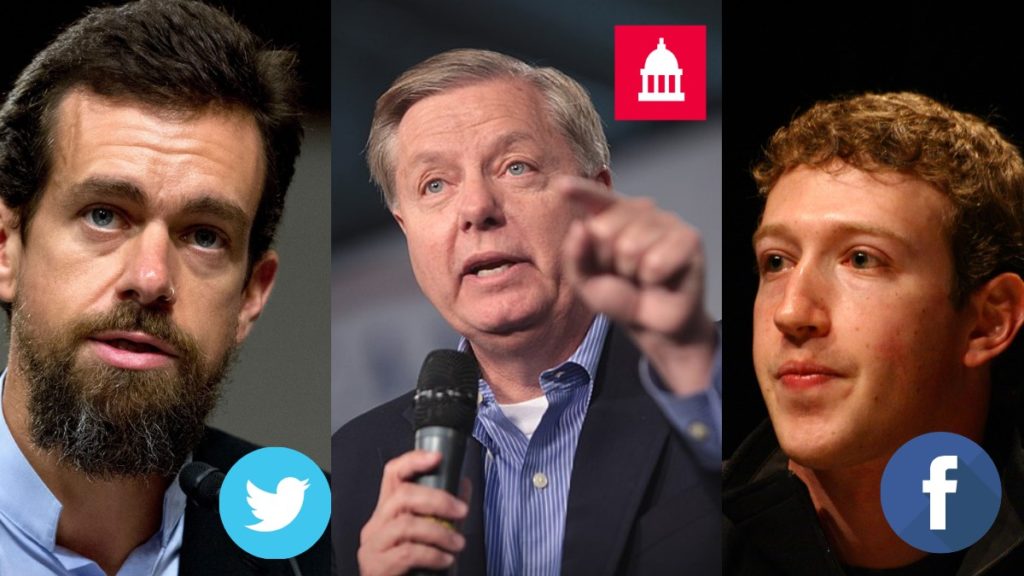The Senate Commerce Committee Section 230 hearing that took place in the U.S. included CEOs of Facebook, Google, and Twitter. What started with Trump’s order to unleash hell upon social media companies, ended up with the U.S. Senate doing so.
During the four-hour-long hearing, section 230 didn’t get the time it deserved. Instead, the hearing turned sideways into the Republicans complaining about the big tech suppressing right-wing views, and the Democrats refusing to ask any questions at all.
This rumble of a hearing addressed some important points that need to be highlighted. So here are the 5 takeaways from the hearing on Section 230 of the Communications Act in the U.S.
Nobody Was Prepared

Yes, the hearing stayed on topic, briefly discussing Section 230.
For the uninitiated, Section 230 is a kind of safety net that makes social media companies immune from being prosecuted for content posted on their platforms.
The whole discussion about changes to Section 230 started when Twitter flagged President Trump’s tweets and he decided to pass an executive order.
In short, the first takeaway is that the hearing is not a result of debate and discussion on the topic, but that of social media messing with the wrong man. The Republicans rained fire on the CEOs, Jack Dorsey of Twitter in particular (and you know why), but there were no substantial discussions on the law and the required changes.
Change In Section 230 Will Hit Everyone
Now that we’ve discussed the basics, let’s get to business,. What do you get when you add Facebook, Google, and Twitter? Financial muscle-power. While Twitter is the smallest of the three, it still has a considerable influence and a huge user-base.
When/If changes are made to section 230, these companies are likely to summon swarms of lawyers to cope with policy changes. Don’t get me wrong, it’ll cost them a considerable fortune. But let’s think about smaller businesses that won’t have the resources to cooperate with the law?
That’s what Facebook CEO Zuckerberg talked about and said that small companies should be exempted from the law when it is enforced. It’s a reasonable suggestion and hints at the proper implementation of the law by considering the entire market, instead of targeting particular companies.
FOSTA-SESTA Is Buried

This is a takeaway that wasn’t talked about, hence buried. Back in 2018, amendments were made to Section 230, with full support from Facebook. Back then, the Senate introduced two laws, jointly called FOSTA-SESTA to fight online sex trafficking. Despite warnings from activists as well as academia, the Senate moved forward with the law.
This hasty implementation resulted in legal sex workers shutting online shops and resorting back to pimps. Eventually, cities like San Francisco started witnessing a tripled crime rate when it came to pimping and sex trafficking. In a nutshell, the last changes made to Section 230 did more harm than good.
It’s probably the reason why there was not a single mention of FOSTA-SESTA when Facebook CEO and the Republican majority that implemented the law were present at the hearing.
Silicon Valley Is Split
Twitter CEO Jack Dorsey was the most vocal of the lot when it came to giving suggestions and being questioned by the committee. Among the turmoil, Dorsey suggested “algorithmic choice” as a way to better moderate the internet. While it’s not a new concept, it is an effective one if the committee pays heed to Dorsey’s suggestions.
Dorsey also stated that a “sweeping change” will likely benefit companies with more resources. Google CEO Pichai also asked the committee to be “very aware of the consequences” any changes might have on business and consumers.
Lastly, Facebook CEO Zuckerberg also cautioned about the outcome of any changes but said he’ll support them. Rest assured, while Facebook and Google may be in support of the changes, Twitter disagrees. Hence, a split in Silicon Valley is clear as day.
CEOs Didn’t Have Answers
Lastly, CEOs of all three companies didn’t have answers to some important questions asked by the committee. “I will get back to you” and “I will follow up with you” were the safety words for this dance in which the committee and the CEOs were engaged.
“Can you tell me specifically how many threats have you proactively referred to local or state law enforcement?” was one of the committee’s questions to Facebook. To this, Zuckerberg said to the committee that he would “follow up with you on that.”
Another question that caught all three CEOs off-guard was “How much are your companies currently spending defending lawsuits related to user content?” The trio once again answered with the safety words.
Other questions included the committee asking the Facebook CEO to provide a list of all the articles suppressed by the platform. Like I said in a previous story about the NY Post article suppression, the matter has been discussed here only. So now the new subpoenas issued to Facebook and Twitter by the Senate Republicans will be nothing but a duplication of efforts.
The post Big Tech CEOs And Section 230 Hearing: 5 Biggest Takeaways appeared first on Fossbytes.
Big Tech CEOs And Section 230 Hearing: 5 Biggest Takeaways
read more
No comments:
Post a Comment